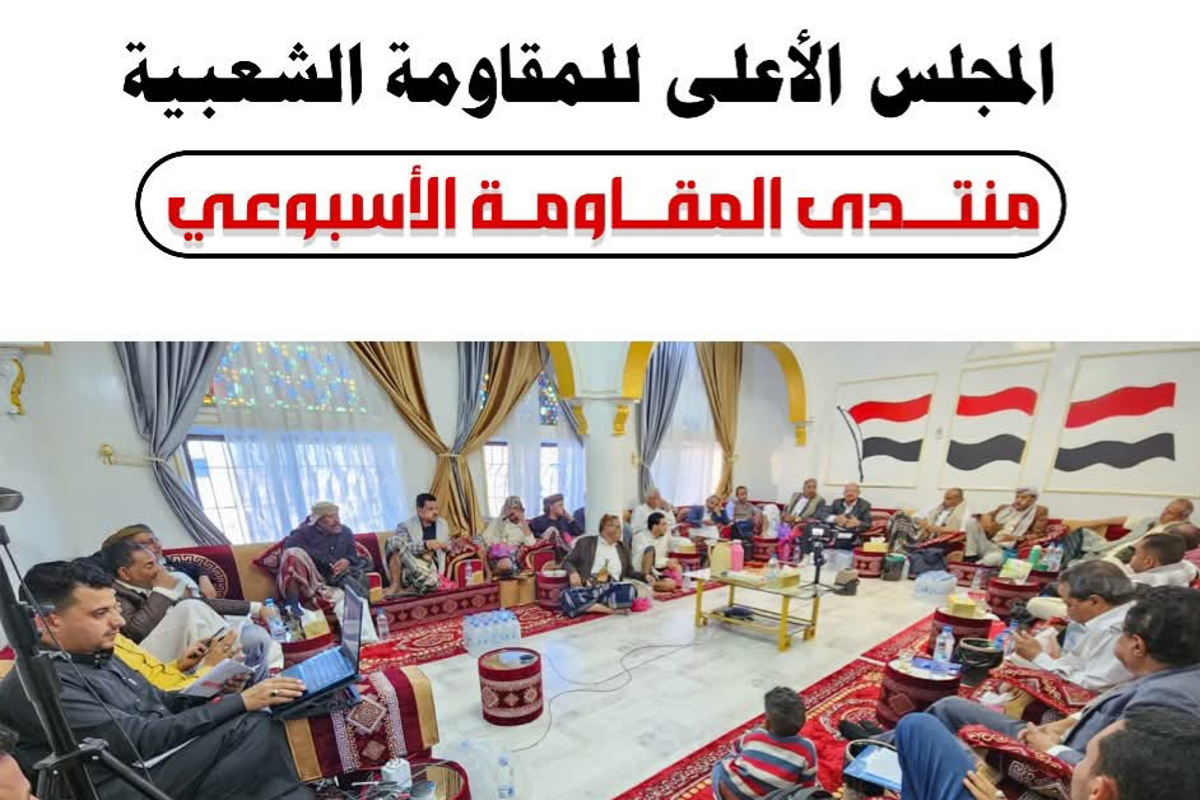Taiz: Resistance Forum Discusses Challenges Facing Education and Teacher Suffering
2025-01-21
Taiz: Private
The weekly resistance forum organized by the General Secretariat of the Supreme Council of Popular Resistance, in its fifth week, discussed the state of education in Taiz governorate through working papers and in-depth discussions. These focused on the suffering of teachers and the challenges facing the educational process amidst the catastrophic collapse of the local currency.
The Secretary-General of the Teachers' Syndicate in Taiz, Professor Abdulrahman al-Maqtari, in his paper titled "The Teacher in Taiz: Responsibilities and Challenges," spoke about the important role played by teachers in Taiz since the outbreak of the Houthi war on the governorate. They stood at the forefront to defend the governorate and the republic, repelling the Houthi coup, while at the same time striving to continue the educational process despite all circumstances and challenges.
Al-Maqtari pointed to a host of concerns facing teachers, particularly in light of the catastrophic collapse of the local currency, while their salaries no longer meet the most basic living requirements, and many of them are not enough to buy a bag of flour. He highlighted the efforts exerted by the syndicate and the continuous follow-up with the responsible authorities to meet the demands of teachers and obtain their rights.
For his part, Dr. Abdulraqeeb al-Samawi, a member of the Academic Accreditation and Quality Assurance Council for Higher Education in Yemen, in his paper that focused on "Diagnosing the Educational Reality in Taiz and Yemen," stated that the educational process is experiencing a catastrophic situation, which necessitates a serious stand by all, government officials, and citizens, to work hard to prevent this catastrophic situation from worsening.
Dr. al-Samawi pointed out in the resistance forum to a number of reasons that led to this deterioration in the educational process, most notably: the absence of a clear philosophy for education, while it is supposed to be based on a very clear vision, on improving the quality of education, and on values that reflect national loyalty. He highlighted the extent of the spread of cheating, while the focus has become on the student's success or failure only, whereas education is supposed to instill values, culture, knowledge, and national loyalty.
The member of the academic accreditation added that education in Yemen lacks strategic plans, and there is no interest in educational policy, as well as a lack of interest in the teacher, which is a destruction that leads to the destruction of the country. He pointed out that there are thousands of teachers who have reached retirement age, while there are thousands of volunteers who cover the deficit in the cadre, a reality that portends a disaster in light of the halt of employment for more than ten years.
Al-Samawi emphasized in the resistance forum the importance of having a mechanism to support education and the need for everyone to pressure the state to pay attention to education, because reforming education is reforming the country.
Dr. Ali Baslama, a professor at the College of Education at Seiyun University, participated in a telephone intervention, in which he referred to the educational conditions in Wadi Hadhramaut, confirming that the teacher in the governorate suffers severely.
Baslama touched on the strikes carried out by the Teachers' Syndicate and other unions to demand their rights. He highlighted the roles played by the former Undersecretary of Hadhramaut Governorate for the Affairs of the Directorates of Wadi Hadhramaut and the Desert, Issam Habrish al-Katiri, in supporting the educational process, foremost of which was the cancellation of the income tax on teachers. He added that the new authorities resumed the deduction from the salaries of teachers, following the change of the agent al-Katiri.
Dr. Baslama referred to the role played by sheikhs, parliamentarians, and social figures in pressuring the local authorities, which resulted in the allocation of 25 thousand riyals per month in addition to the teacher's salary, amid promises to allocate an additional 25 thousand.
For their part, the attendees presented rich interventions, as they pointed to the danger of the deterioration of the educational process, and emphasized the need to continue the educational process and take care of the teacher, and to pressure the government to assume its responsibilities towards the education sector and the economic sector, while stressing that completing the liberation and ending the Houthi coup is the way to end these catastrophic conditions.
